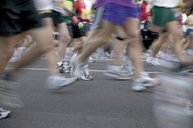McGillians warm up
Montreal to attract thousands of athletes to the First World Outgames

Power lifters, swimmers, bowlers and billiards players will descend on Montreal this summer for the town's biggest sporting event since the '76 Olympics: the First World Outgames.
Like the better-known Gay Games, the Outgames, which will be held July 26 to August 5, are an inclusive competitive sporting event for lesbian, gay, bisexual and transgender (LGBT) athletes from around the world, and are open to anyone who supports the event's ideals. Up to 16,000 participants are expected, with 250,000 more to cheer them on.
Richard Montoro, a psychiatrist at the McGill University Health Centre, is competing in the dragon boat race. He's on a gay and lesbian team called Aido Hwedo, created just for the Outgames and named for the rainbow serpent of the Dahomey legend. The Royal Victoria Hospital team will also compete.
Montoro relishes the camaraderie of being part of a team, having shied away from team sports until he was 34, when he started dragon boat racing. In their youth, many gays and lesbians gravitate towards solo sports where their sexuality isn't an issue. Montoro calls participating in team sports "a wonderful growing experience, I would recommend it to anyone."
Montreal Children's Hospital pediatrician David McGillivray, 56, is taking on the half-marathon. No stranger to competition, he ran the same course last year in the Montreal Marathon, and went to the Gay Games in Australia four years ago. Way back, he competed in the Grenoble Olympics in 1968 as a figure skater. He made the switch from ice to road during his time-strapped medical studies, and now takes on a gentler pace. "My goals now are more about participating than winning medals."
McGill's Career and Placement Services director Gregg Blachford thinks the Outgames will attract a more international crowd than the Gay Games, particularly from Francophone countries. Blachford is running in the 10 km road race — "the shortest possible distance," he jokes. "I started running eight years ago as a new form of fitness and enjoy the buzz of events. It's very exciting to be in a large mass of people dedicated to physical fitness and health." And GBLT-positive sporting events can mean a lot to the community. "These games are successful for challenging stereotypes of gays and lesbians," Blachford says. "I call this 'the revenge of the locker room.' Those boys in high school who were beating us up, I wonder if they're into sports now," he muses.
Pierre-Paul Tellier, director of Student Health Services, is coordinating the medical teams for the opening and closing parties that will be put on by the Bad Boy Club of Montreal. For years, Tellier has volunteered for them for the raucous Black & Blue party weekend. He's used to handling medical situations from drug overdoses to the blistered feet of enthusiastic dancers, but wonders if this party for athletes will be different. "These people are supposed to be health freaks! These are people who are aware of their health and bodies in a different way."
The closing party could bring as many as 14,000 people to the Palais des Congrès. For the medical teams, Tellier will rally together 20 to 25 people, mostly medical students who are eager for experience in emergency medicine or for the chance to see patients in a new setting. Tellier sees his work as an investment in getting them to develop new skills. "It opens their minds and broadens their perspectives."
The games will also include the International Conference on LGBT Human Rights, as well as many cultural events. For more information, see www.montreal2006.org.

